| Pages:
1
2
3
4
5
6
..
8 |
vano
National Hazard
   
Posts: 661
Registered: 22-3-2019
Location: Georgia
Member Is Offline
|
|
Thank you
|
|
|
Housane
Hazard to Others
  
Posts: 127
Registered: 3-9-2018
Location: Worcester, England
Member Is Offline
Mood: Let’s make
|
|
Ok thanks, where did you find your nitrite? As it is a explosives precursor here
Green QD's so far
Feel free to correct grammar or incorect knknowledge. We are all learning.
|
|
|
RustyShackleford
Hazard to Others
  
Posts: 200
Registered: 10-12-2020
Location: Northern Europe
Member Is Offline
|
|
i purchased a pound of it from ebay in 2019, it was from britain so idk if youre correct, or maybe the laws have changed since then for nitrite
|
|
|
artemov
Hazard to Others
  
Posts: 181
Registered: 22-8-2018
Member Is Offline
|
|
Can you elaborate more on this, or can you point me to a resource or something? I have malonic acid and hydroxylamine hcl ...
|
|
|
artemov
Hazard to Others
  
Posts: 181
Registered: 22-8-2018
Member Is Offline
|
|
Quote: Originally posted by Housane  | | What amazing colours, I want to try and make sum but I can't find any sodium nitrite over here as it is a restricted chemical, could it be substuted
for any easier to obtain chemicals here in the UK? |
Do you have access to poppers? It's an alkyl nitrite, but I'm not sure how pure are commercial poppers.
[Edited on 10-2-2021 by artemov]
|
|
|
h0lx
Hazard to Self
 
Posts: 69
Registered: 31-12-2005
Member Is Offline
|
|
Pyridinium violurate. Strangely in solution it's much like permanganate but the crystals are orange
https://imgur.com/gallery/xrDb5el
|
|
|
Tsjerk
International Hazard
    
Posts: 3032
Registered: 20-4-2005
Location: Netherlands
Member Is Offline
Mood: Mood
|
|
Nice!
Can you embed the photos in your post? Otherwise the are lost when the link breaks.
|
|
|
Amos
International Hazard
    
Posts: 1406
Registered: 25-3-2014
Location: Yes
Member Is Offline
Mood: No
|
|
I don't believe I've seen anyone post an aniline salt yet, that would be neat. Piperidine too if anyone has it.
Thanks a bunch for bringing this to everyone's attention, Mr. Gribble
|
|
|
Boffis
International Hazard
    
Posts: 1883
Registered: 1-5-2011
Member Is Offline
Mood: No Mood
|
|
Aniline may not be a strong enough base but piperidine should form a salt
|
|
|
RustyShackleford
Hazard to Others
  
Posts: 200
Registered: 10-12-2020
Location: Northern Europe
Member Is Offline
|
|
Quote: Originally posted by Amos  | I don't believe I've seen anyone post an aniline salt yet, that would be neat. Piperidine too if anyone has it.
Thanks a bunch for bringing this to everyone's attention, Mr. Gribble |
I did make the aniline salt but it was kinda ugly, possibly due to decomposition impurity in the aniline. Its on page 2 of this thread.
As for piperidine, i do have some 200mg of the HCl salt, but the freebase smells so horrible (like rotten cum) i dont want to do it. Perhaps when ive
built a fumehood.
|
|
|
Bezaleel
Hazard to Others
  
Posts: 444
Registered: 28-2-2009
Member Is Offline
Mood: transitional
|
|
I received some violuric acid from RustyShackleford yesterday in order to test what colours its rare earth salts have - thanks!. It's already after
midnight now, but I could not resists the temptation to do one test.
Violuric acid is sparingly soluble in cold water, but much better in hot water. I noticed a somewhat sweetish smell coming off the warm solution
(~60C).
0.291g of violuric acid was dissolved in ~15ml warm water, giving a clear purple solution (the dry salt is off white). This was added to a solution of
0.229g EuCl3.6H2O in a few ml water, yielding an orange solution!
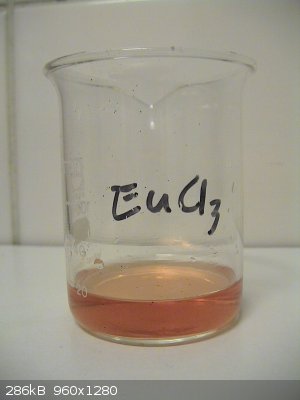
The solution is evaporating in a desiccator over NaOH. I'm charging up my UV lamp batteries to see whether the solution still fluoresces. EuCl3
solution (as well as the solid compound) fluoresces with a reddish colour.
|
|
|
RustyShackleford
Hazard to Others
  
Posts: 200
Registered: 10-12-2020
Location: Northern Europe
Member Is Offline
|
|
Remade the aniline violurate with distilled clean amine, its a very dark red.
Anthranilic acid violurate is a light orange.
Im planning to make some substituted anilines and try with those (N- acetyl, N-benzyl, N-benzylglycine)
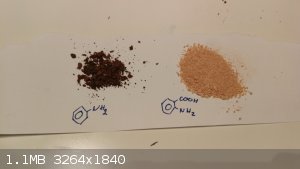
Side note: i have noticed that the color of the salts seem to "develop" over time. Like for example the Ni salt i made is now a more consistent and
nicer shade of green than it was when i initially made it. No good idea of what the cause is.
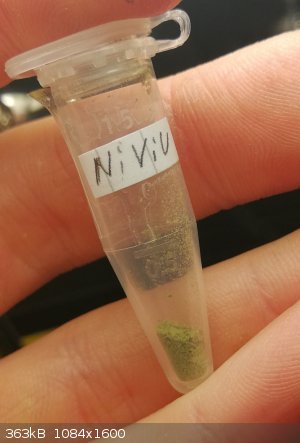
[Edited on 7-3-2021 by RustyShackleford]
|
|
|
Bezaleel
Hazard to Others
  
Posts: 444
Registered: 28-2-2009
Member Is Offline
Mood: transitional
|
|
Adding violuric acid to solutions of rare earth chlorides proved not a good idea. I had hoped to evaporate the HCl in solution over NaOH in a
desiccator and obtain the rare earth violurates, but this did not happen. Instead, the Eu-violurate shown in my 7 March post lost its colour and a
creme coloured solid was obtained.
So I continued to combine carbonates and hydroxides with violuric acid instead of chlorides. Sm2(CO3)3 gave a deep red solution which on drying gave
red-brown granular crystals. I assumed the carbonate to be a 2.5 hydrate as posted here (bottom of page 8), but seeing I have some Sm-carbonate coloured residue, my carbonate may just have been dry.
Pr(OH)3 also gave a deep red solution. Pr(OH)3 was added in excess and intensely stirred for 15 minutes on a 70C hotplate. The solution was then
filtered using a fine fritte. It's is now drying in a desiccator over NaOH.
Li2CO3 gave a strongly permanganate coloured solution, which on drying gives an intense almost fluorescent pink solid.
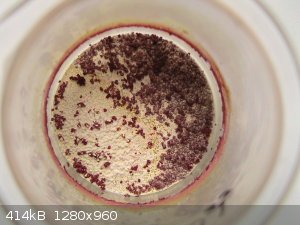 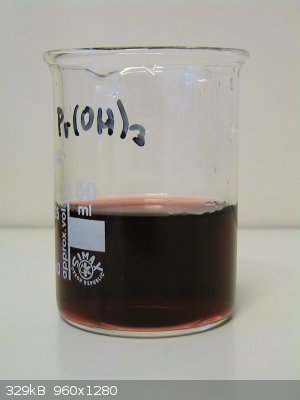 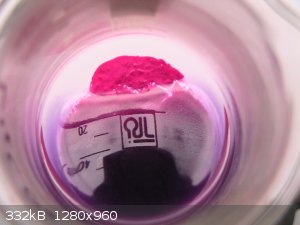
Edit: fixed link
[Edited on 12-3-2021 by Bezaleel]
|
|
|
RustyShackleford
Hazard to Others
  
Posts: 200
Registered: 10-12-2020
Location: Northern Europe
Member Is Offline
|
|
@Bezaleel
Wow that lithium salt looks amazing!
I have also noticed that its not really possible to make the violurate from strong acid salts of the metal, unless the metal violurate is quite
insoluble. The technique i have been using for almost all of the salts i made is to make the carbonate or hydroxide of the metal, adding water +
stoiciometric violuric acid, and evaporating that with the hotplate on 120C in a 50ml beaker. For ~0.2g violuric + corresponding metal
carbonate/hydroxide ive been using 10-15ml of water. If you get a crummy looking product i have found that washing the salt w some acetone helps.
|
|
|
Bezaleel
Hazard to Others
  
Posts: 444
Registered: 28-2-2009
Member Is Offline
Mood: transitional
|
|
So we ended up using the same method, apart from the use of a desiccator vs. a hotplate to evaporate the solution. I was not sure whether the
violurate would stand temperatures over 100C, so I chose low pressure over temperature.
It seems like all the rare earths form red-brown compounds, so it may be more interesting to make a few non-rare earth ones instead. I can choose from
indium, bismuth, antimony, vanadyl, maybe uranyl, rhenium, chromium, molybdenum, tungsten, and diethylamine. Of molybdenum, tungsten, and rhenium I
don't expect much, but you never know, of course. (Other rare earth choices would be erbium, dysprosium, neodymium, holmium, lanthanum (~95%), and
gadolinium.)
Please let me know your preferences.
Doe anyone know whether cyanuric acid could be used to make violuric acid from in a home lab?
|
|
|
RustyShackleford
Hazard to Others
  
Posts: 200
Registered: 10-12-2020
Location: Northern Europe
Member Is Offline
|
|
Vacuum is better, i just dont have a pump good enough for that.
I would like to see all of those done, but if i had to pick a few i think uranyl>rhenium>indium.
A full rare earth series would be very cool, but ofc thats a lot of work.
|
|
|
Bezaleel
Hazard to Others
  
Posts: 444
Registered: 28-2-2009
Member Is Offline
Mood: transitional
|
|
Updates
Samarium
I redissolved the Sm violurate and filtered off the undissolved carbonate, obtaining a warm clear solution. As it cooled down, a beige film formed on
the flask. The solution was poured off and dried in a desiccator over NaOH, forming a deep red solid.
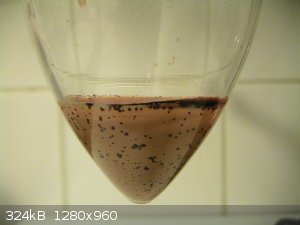 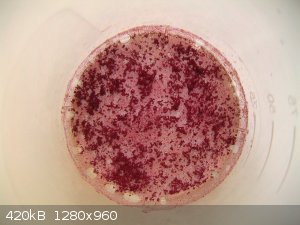
Praseodymium
A new sample was made using Pr(OH)3. The hydroxide was stirred powerfully with demiwater, filtered again and then used. 0.300g of violuric acid was
added to an excess of Pr(OH)3 and the undissolved hydroxide filtered off. When left to crystallise over NaOH, an orange-yellow film formed on the
walls of the beaker and after everything had dried up completely, a mix of dark red and yellow-orange crystals had formed. As far as possible, the
dark crystals were separated and the rest was redissolved - the yellow crystals did not dissolve on heating, but the red ones did. The solution is now
crystallising again.
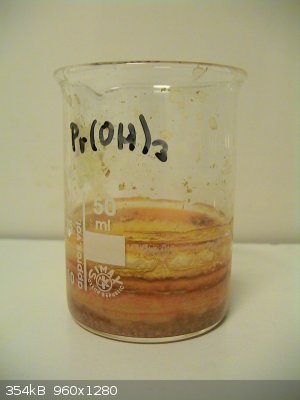 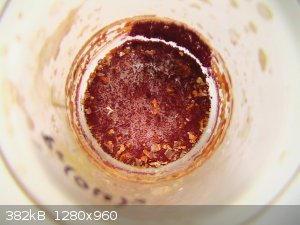 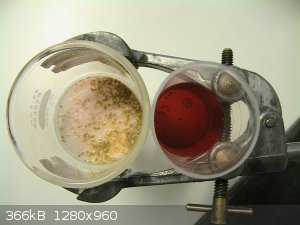
A comparison between the Sm and Pr salts is in the last picture. It looks like the colour of the compounds is mainly caused by interactions inside the
violuric acid ligand and not so much by the metal-ligand interactions. In particular the weak green of the Pr forbidden transitions seems to be
retained, and causes a minor difference in colour of the salt as compared to Sm.
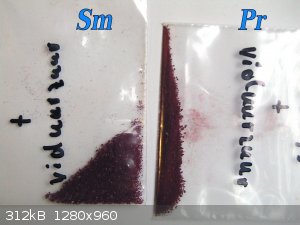
Indium
0.096g of indium were dissolved in 10% HCl. This took a long time, although the acid was heated to near boiling. The indium was precipitated with
ammonia solution and the supernatant liquid pipetted off 3 times. 300mg of violuric acid were added. The solution turned purple immediately, which
suggests that not all of the ammonium had been removed, although the pH of the solution with the In(OH)3 was 8.
On heating hardly any of the precipitate dissolved. The beaker was covered with cling film and put on a stirrer at 1200 rpm and heated at 70C plate
temperature and stirred for 1 hour. Still much In(OH)3 remained undissolved, but the mix had obtained a colour resembling molybdenum blue.
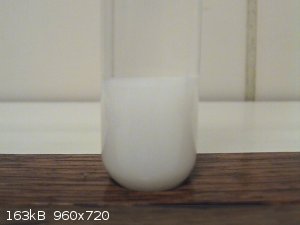 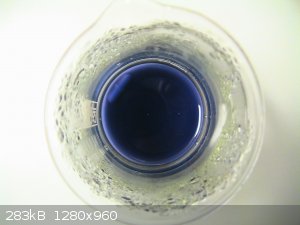 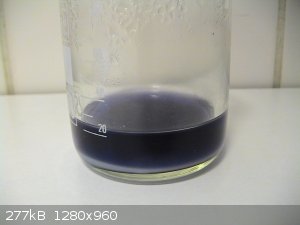
It seems that indium is chemically too basic to easily form a salt with violuric acid. My estimate is that this will count all the more for Re, Mo and
W. I decided that I will not make the uranyl salt, because of the precautions necessary to safely work with it. I consider cerium, which is
interesting because it is a coloured RE and also has a stable +IV oxidation state, and aluminium.
|
|
|
DraconicAcid
International Hazard
    
Posts: 4360
Registered: 1-2-2013
Location: The tiniest college campus ever....
Member Is Offline
Mood: Semi-victorious.
|
|
So violuric acid is made from barbituic acid....I wonder if something similar could be made from Meldrum's acid (which seems easier to make than
barbituic).
https://en.wikipedia.org/wiki/Meldrum%27s_acid
Please remember: "Filtrate" is not a verb.
Write up your lab reports the way your instructor wants them, not the way your ex-instructor wants them.
|
|
|
Texium
Administrator
       
Posts: 4621
Registered: 11-1-2014
Location: Salt Lake City
Member Is Online
Mood: PhD candidate!
|
|
I think it should be possible! Meldrum’s acid is a very
nice compound. I’ve worked with it a couple of times and it loves to undergo those sort of reactions. Without the nitrogens though, it may not have
the same interesting coordination properties. It’s also not the most stable thing since it’s a geminal bis-lactone. Still, definitely worth a try.
|
|
|
RustyShackleford
Hazard to Others
  
Posts: 200
Registered: 10-12-2020
Location: Northern Europe
Member Is Offline
|
|
Shame that the indium didnt form a solid, the solution looks real nice though. Also im quite suprised the Sm and Pr are so similar in color, from all
the other salts i woulve expected a bigger differece. They both look quite nice though, thank you for taking the time to produce the salts and post
pictures!
|
|
|
Lion850
National Hazard
   
Posts: 517
Registered: 7-10-2019
Location: Australia
Member Is Offline
Mood: Great
|
|
I follow this thread with much interest. Sadly up to now I did not manage to find any precursors to make violuric acid in Australia. And local prices
I was quoted for violuric acid is astronomical.
|
|
|
Boffis
International Hazard
    
Posts: 1883
Registered: 1-5-2011
Member Is Offline
Mood: No Mood
|
|
Depending on what other basic chemicals you have access to (ie nitric acid) you can prepare violuric acid from bird shit!
Guano -> uric acid -> alloxan -> alloxan-5-oxime (violuric acid)
The first step is the most difficult and complex because of the need to filter intensely alkaline solutions that result from the extraction of guano
with caustic soda
|
|
|
vano
National Hazard
   
Posts: 661
Registered: 22-3-2019
Location: Georgia
Member Is Offline
|
|
Hi. RustyShackleford gave me violuric acid and will make some violurates. Today i made scandium violurate, i used scandium carbonate. Nice yellow-
brown colour.
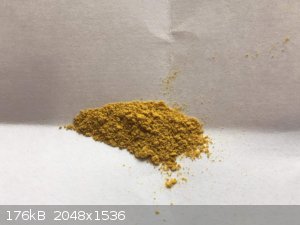
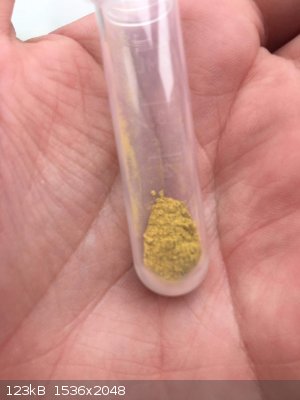
|
|
|
RustyShackleford
Hazard to Others
  
Posts: 200
Registered: 10-12-2020
Location: Northern Europe
Member Is Offline
|
|
Quote: Originally posted by vano  | Hi. RustyShackleford gave me violuric acid and will make some violurates. Today i made scandium violurate, i used scandium carbonate. Nice yellow-
brown colour.
|
Very nice! Thats the first yellow violurate salt i believe
|
|
|
vano
National Hazard
   
Posts: 661
Registered: 22-3-2019
Location: Georgia
Member Is Offline
|
|
Thanks. This is indium violurate. Brown- dark red colour. I used indium carbonate. Carbonates are better.
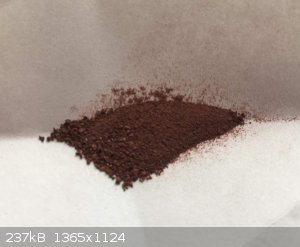
[Edited on 27-3-2021 by vano]
|
|
|
| Pages:
1
2
3
4
5
6
..
8 |